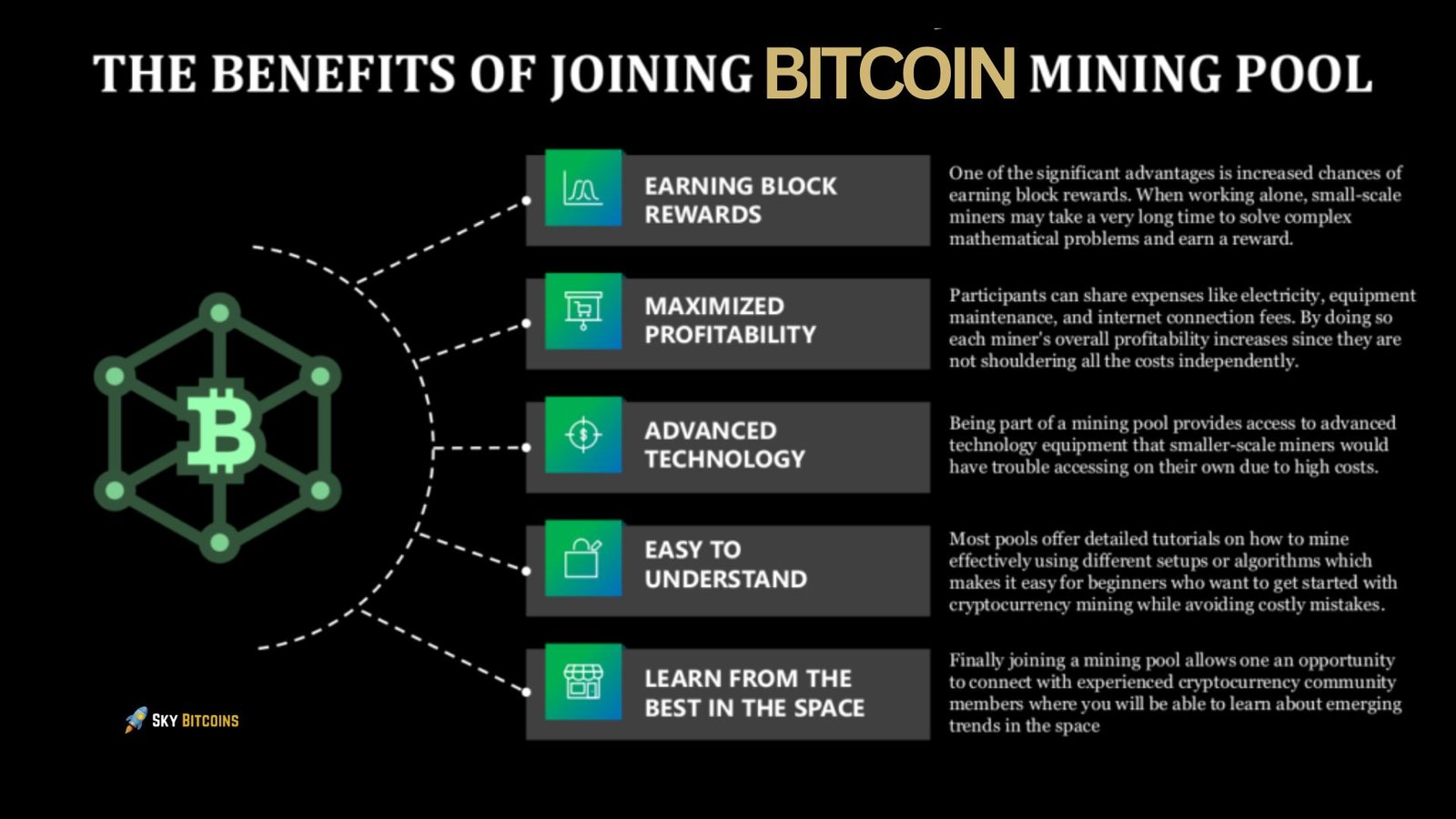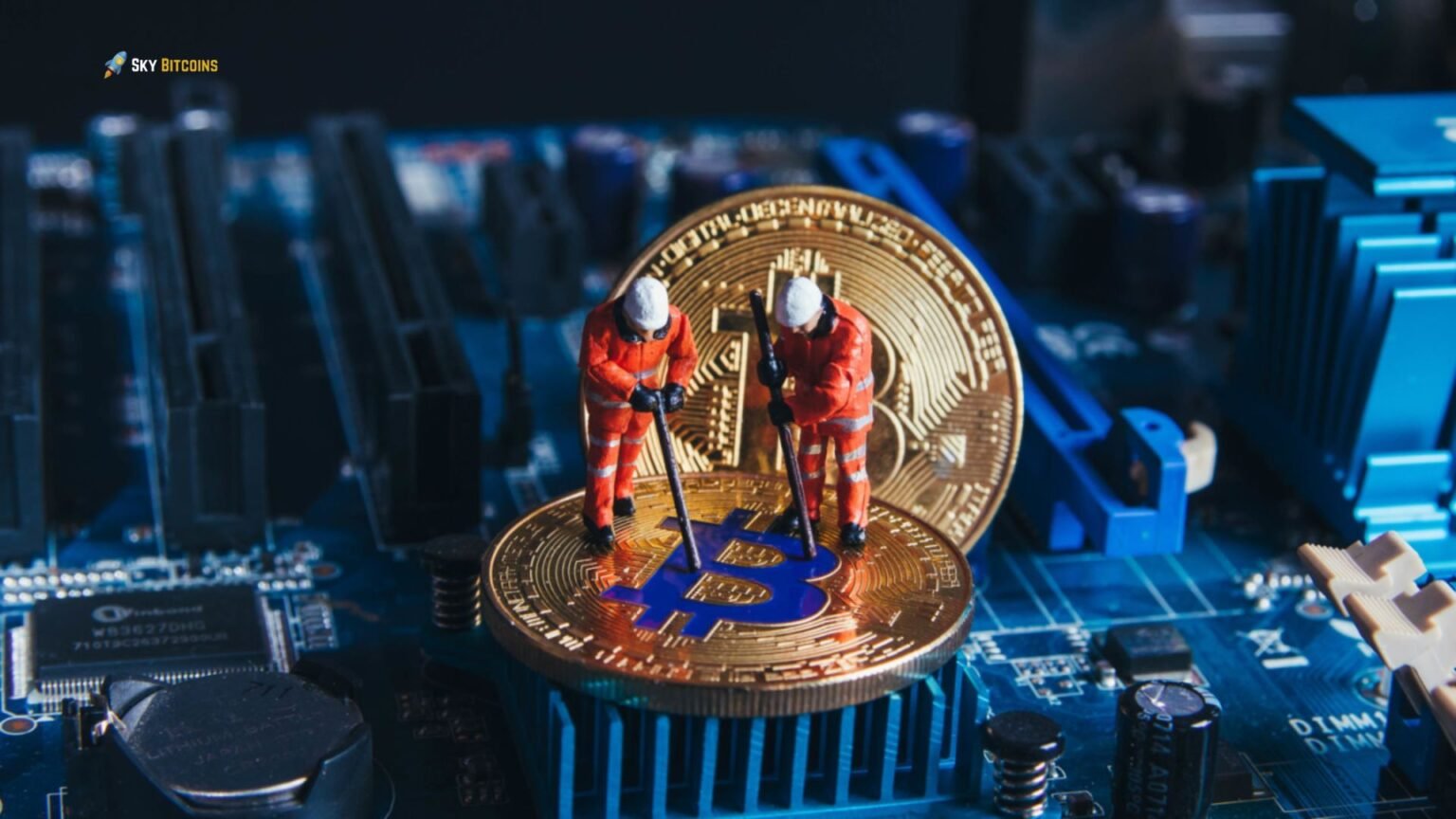Since the cryptocurrency’s beginnings, Bitcoin mining has dramatically changed from small-scale operations using personal computers to massive mining farms using Application-Specific Integrated Circuits (ASICs). To stay competitive and boost their chances of receiving rewards, many individual Bitcoin miners are resorting to mining pools as the difficulty of mining continues to rise. This page provides a comprehensive overview of Bitcoin mining pools, including their function, pros and cons, and answers to frequently asked questions.
What is a Bitcoin Mining Pool?
The term “mining pool” refers to a network of computers that work together to increase the difficulty of solving a block in Bitcoin. When miners join forces in a mining pool, they may solve blocks far more quickly than when they work alone, which means larger rewards for everyone. Each pool member receives a portion of the reward for solving a block according to the hashing power they supplied. As competition and difficulty increased in the mining industry, the idea of mining pools arose. In contrast to the bigger benefits of single miners, smaller miners in a pool can receive payouts more frequently.
How Do Bitcoin Mining Pools Work?
Bitcoin mining pools combine the computational power of multiple miners to increase their chances of successfully solving a block. When miners join a pool, they connect their mining hardware to the pool’s server, allowing their collective hashing power to solve the cryptographic puzzles required for mining Bitcoin. Instead of mining solo, where the likelihood of solving a block is low, and rewards are infrequent, miners in a pool collaborate to share the workload and increase the probability of earning rewards.

When the pool successfully solves a block, the block reward, which includes new bitcoins and transaction fees, is distributed among the pool members based on the amount of hashing power they contributed. Different pools have varying payout structures, such as Pay-Per-Share (PPS) or Proportional payouts, which dictate how rewards are distributed. By pooling resources, miners benefit from more regular payouts and reduced variance in earnings, making it a more attractive option for many individuals participating in Bitcoin mining.
Drawbacks of Mining Pools
Although mining pools have many benefits, miners should also know the downsides. The pool fees are a major drawback; they usually amount to one percent to three percent of the won prizes. Miners with limited resources may reduce their total profitability due to these costs. The Bitcoin network’s decentralized character is also threatened by the concentration of power in bigger pools. A threat to the network’s stability and efficiency may arise if a small number of big pools control a disproportionate share of the hashing power.
Additionally, pool miners do not have complete autonomy over their mining operations since the pool operator usually decides which blocks to mine and how to run the operation. This reliance poses a risk if the pool encounters managerial or technological challenges. Last but not least, one of the problems of depending on mining pools is that regular participants’ earnings might be affected by volatility caused by pool hopping, in which miners often move between pools to maximize short-term profits.
Benefits of Mining Pools

- Higher Probability of Earning Rewards: Joining a mining pool improves the odds of smaller miners with fewer resources solving a block and getting rewards.
- More Frequent Payouts: Payouts from mining pools are more consistent than those from solo mining. Mining a block alone can take weeks or months, but rewards are distributed more regularly according to contributions when working in a pool.
- Reduced Variance: Mining in a pool mitigates payment volatility. Even while individual miners might experience a “dry spell” where they don’t locate a block, earnings can be more consistently stable if they pool their resources.
- Community Support: You can find helpful hints, strategy discussions, and technical support from other pool members in many of these active communities.
- Access to Advanced Tools: Mining pools provide sophisticated tools and dashboards that allow miners to monitor their progress, revenue, and operational efficiency.
Choosing a Bitcoin Mining Pool
- Pool Size and Hash Rate: Although more participants may compete for rewards, larger pools typically have a better probability of solving barriers. Smaller pools may have fewer frequent block finds, but the payments might be higher.
- Fee Structure: Understand the pool’s expenses and how they can reduce your earnings. Look for pools with clear pricing policies.
- Payment Methods: Review the pool’s payment procedures. Understand how and when payments are made and ensure they match your preferences.
- Reputation and Trustworthiness: Decide how the neighborhood thinks about the pool.. Look into what other miners have said about it in reviews, threads, and comments.
- User Interface and Support: An intuitive UI makes mining easier. If you have tech issues, make sure the pool has help.
Also Read: Bitcoin Mining Software: Latest trends, programs and key factors
Conclusion
Mining pools for Bitcoin have grown in importance in the cryptocurrency mining industry. They improve miners’ odds of winning rewards and make payouts more reliable. A miner’s experience and profitability can be greatly affected by their knowledge of mining pools. However, there are pros and negatives to think about. As the cryptocurrency business grows, mining pools may suit Bitcoin miners who don’t want the headaches.
FAQs
1. What is the best Bitcoin mining pool?
What constitutes the optimal mining pool can vary from person to person and situation to situation. Slush Pool, F2Pool, AntPool, and Poolin are some of the most well-known mining pools. Compare their reputation, payment structures, and costs to find a pool that works for you.
2. How much can I earn from a mining pool?
Your part of the pool’s hashing power, pool size, and payment structure influence your mining earnings. Unlike mining alone, joining a mining pool can yield more consistent payouts, but earnings vary.
3. Do I need special hardware to join a mining pool?
Mining Bitcoin using normal hardware is possible, but ASIC miners are more efficient. Many pools also let miners earn Bitcoin by mining other cryptocurrencies with GPU rigs.
4. Can I switch mining pools at any time?
Indeed, miners typically have the freedom to transfer pools at any time. But remember that leaving a pool could cost you money and affect your earnings.
5. Is it safe to join a mining pool?
Selecting a trustworthy pool before joining a mining pool is important, but doing so is usually safe. Verify the pool’s track record, check user evaluations, and ensure their security measures safeguard miners’ money and data.

















